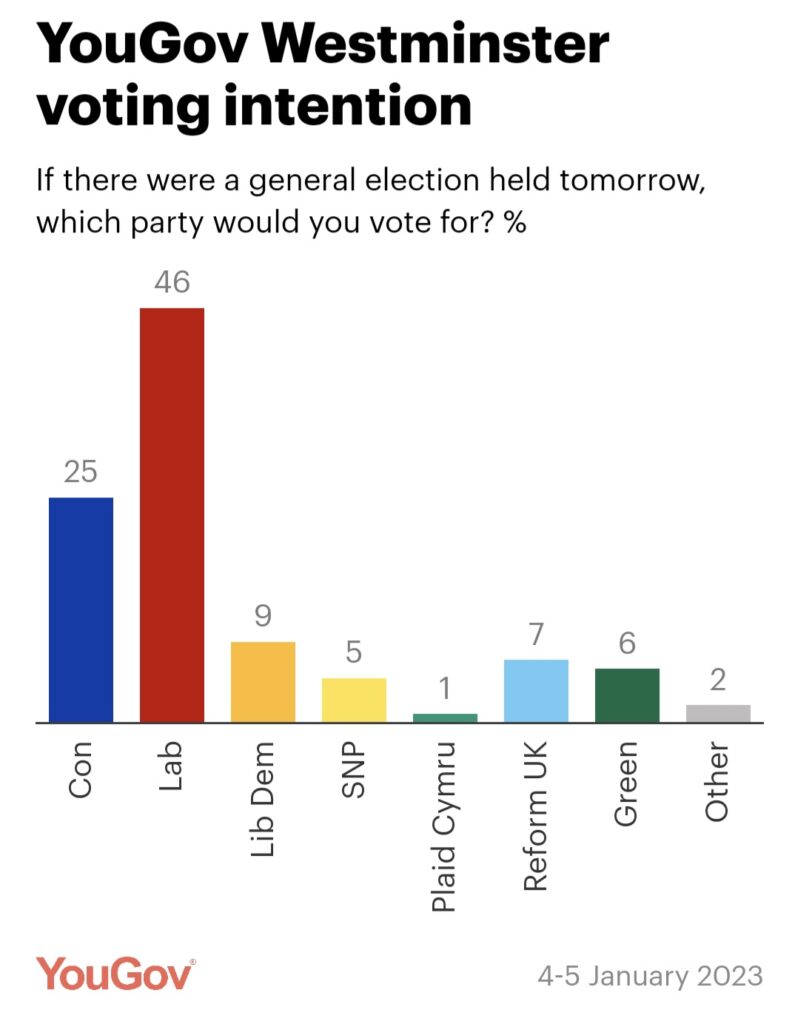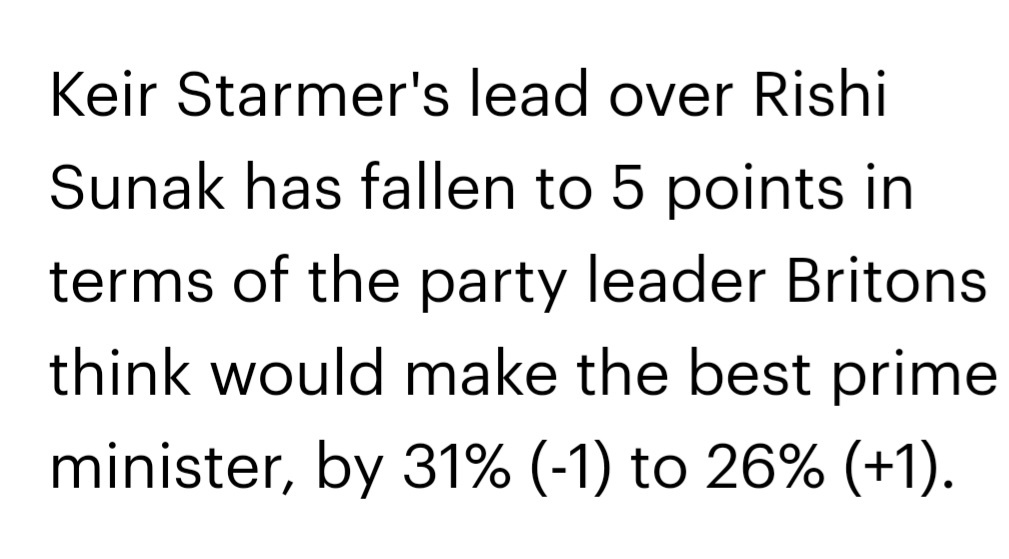By John Pickard
It is clear from the most recent opinion polls that the Labour Party’s fortunes are rising despite its current leadership. The YouGov poll for January 4-5 shows Labour still miles ahead of the Tories in terms of voting intentions, more than twenty points ahead.
In the face of the biggest assault on living standards that most living people can remember, it is hardly surprising that a huge swathe of the population is anxiously seeking an alternative to a government run for the rich and by the rich. Labour’s gains in the polls, however, have nothing to do with Keir Starmer, although his party is clearly seen at the most viable alternative government.
When it comes to the leaders themselves, ie answering the question ‘who would make the best Prime Minister?’ Starmer is only five points ahead of the wealthiest MP in the House of Commons, by 31% to 26%. And, as YouGov points out, Starmer’s lead over Sunak is falling.
Last week, both party leaders made ‘keynote’ speeches, less than 24 hours apart. Not only were they delivered at nearly the exact same location in east London, but as an analysis in the Guardian pointed out the following day, the content of the two speeches bore an uncanny resemblance to each other.
Sunak’s “big message” in the face of a collapsing NHS, a living standards crisis unprecedented in modern times, and a strike wave that shows no signs of abating, was to offer “five pledges” that were notable by their vagueness and/or pointlessness. Inflation, he promised, will be “halved”, meaning living standards will continue to fall…but by a smaller amount.

A longer and deeper slump than any other G7 country
NHS waiting lists will be “cut”, although it is not clear by how much. Sunak will “grow the economy” – which will be a tough call, given that the British economy, according to leading economic institutions, is facing a longer and deeper slump than any other G7 economy.
In a nod to the head-bangers on the Tory right, Sunak is going to deal with the ‘small boats issue’ – whereby desperate people attempt to get to the UK by a hazardous Channel crossing, because of the absence of any other ‘legal’ means. Who knows? Perhaps Sunak will make it illegal to be desperate, or fearful, or homeless.
Finally, and headlined in all the papers, was Sunak’s pledge to increase maths teaching, (without more maths teachers), no doubt so that people can count the decline in their living standards more accurately and work out the average number of ambulances queuing outside A&E departments.
Keir Starmer, having offered “ten pledges” in his leadership bid three years ago, and then having promptly ditched them, is understandably steering clear of making more pledges. However, he certainly matched Sunak in vagueness. He has long since abandoned the “British Recovery Bonds” he pulled out of his backside two years ago; they didn’t get a mention.
Regional devolution, but no extra cash
What Starmer did offer was a new form of regional devolution, under the heading “take back control” – a blatant nod in the direction of Brexit loonies. However, there will be no new money for regional infrastructure or transport investment – Starmer made that very clear – but regional governments will get powers to distribute the poverty and decay as they wish and not as Westminster dictates.
According to the Guardian report (few Labour members will have heard the speech) Starmer made eight references to the Tories’ “sticking plaster politics”, without, it seems, any acknowledgement of his own Elastoplast.

Matching Sunak’s vagueness on the economy, Starmer has made it clear that he will not be “getting out a big government cheque book”, although it is not clear how that squares with pledges on green energy and infrastructure investment.
The NHS is falling apart before our eyes, although it is still held in great affection by the big majority of the population and is a highly effective system when it is properly funded. But even on the NHS, Starmer wasn’t able outdo Sunak. Where Sunak promised to reduce waiting lists, without a policy to do it, Starmer’s plan is to train more NHS staff, and avoid “sticking-plaster politics”, an odd metaphor in the context of health care.
No support from Starmer for striking NHS staff
Starmer refused point blank in a subsequent question and answer session to give his support to nurses, paramedics and other NHS staff obliged against their better natures, to go on strike for decent wages. In regard to workers maintaining (note: not improving) their living standards, the Labour leader was just as vague as the Prime Minister.
We have a strange political situation, but one that we cannot wish away. We have the richest-ever Prime Minister in British history, supervising the biggest cut in living standards and for the greatest number of people in modern times. Yet the leader of the opposition,Keir Starmer,is only just more popular Sunak.
What is notable, however, is that for the disgruntled man and woman in the street, at least in England and Wales, Labour is seen as the only viable alternative government. Labour looks likely, therefore, to get a significant increase in its vote next election. In a very real and meaningful way, the Labour Party is far from ‘dead’, despite its leadership.
The contradiction between these two sets of data point to one thing: Labour may look likelyto be elected, but an incoming Labour government will be a government of crisis from the beginning. A failure to address the issues that people want to have addressed will lead to convulsions in the labour movement. It will become clearer to a lot more people then that Keir Starmer and Labour’s right wing are on the wrong side of history.



